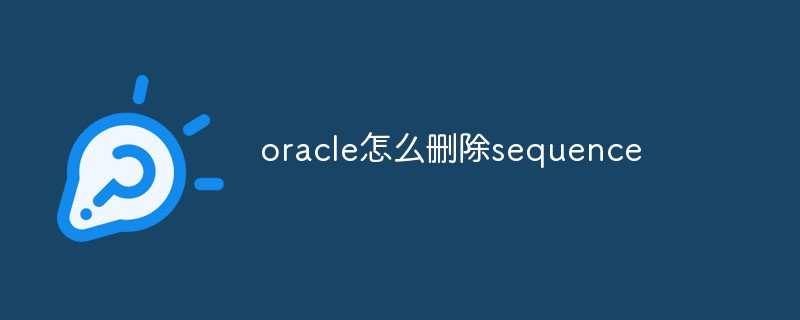Division operation in Oracle involves two operators: / (division) and MOD (remainder). The division operator / is used to calculate the quotient (floating point number), while the MOD operator is used to calculate the remainder (integer). The choice of operator depends on what is being calculated: / for commercial, MOD for remainder. It should be noted that the divisor cannot be 0, and the result of the MOD operator has the same sign as the divisor and is always a non-negative integer.

Division operation in Oracle
In Oracle, the division operation is used to calculate the quotient between two values. . There are two basic division operators:
1. / (division):
/ operator is used For calculating the quotient of two numbers, the result is a floating point number. For example:
<code>SELECT 10 / 3 FROM dual;</code>
Result:
<code>3.333333333333333</code>
2. MOD (remainder):
##MOD## The # operator is used to calculate the remainder when dividing two numbers. For example: <pre class="brush:php;toolbar:false"><code>SELECT 10 MOD 3 FROM dual;</code></pre> Result:
<code>1</code>Choose the correct operator
Choose to use
/ or MOD operator, depending on what you want to calculate:
- Quotient (floating point number):
- Use the / operator.
- Use the MOD operator.
- /
- The divisor of the operator cannot be 0. If the divisor is 0, an exception will be thrown.
- The operator's divisor cannot also be 0. If the divisor is 0, an exception will be thrown.
- The result of the operator has the same sign as the divisor. The result of the
- operator is always a non-negative integer.
The above is the detailed content of How to write division in oracle. For more information, please follow other related articles on the PHP Chinese website!
 oracle怎么查询所有索引May 13, 2022 pm 05:23 PM
oracle怎么查询所有索引May 13, 2022 pm 05:23 PM方法:1、利用“select*from user_indexes where table_name=表名”语句查询表中索引;2、利用“select*from all_indexes where table_name=表名”语句查询所有索引。
 什么是oracle asmApr 18, 2022 pm 04:16 PM
什么是oracle asmApr 18, 2022 pm 04:16 PMoracle asm指的是“自动存储管理”,是一种卷管理器,可自动管理磁盘组并提供有效的数据冗余功能;它是做为单独的Oracle实例实施和部署。asm的优势:1、配置简单、可最大化推动数据库合并的存储资源利用;2、支持BIGFILE文件等。
 oracle全角怎么转半角May 13, 2022 pm 03:21 PM
oracle全角怎么转半角May 13, 2022 pm 03:21 PM在oracle中,可以利用“TO_SINGLE_BYTE(String)”将全角转换为半角;“TO_SINGLE_BYTE”函数可以将参数中所有多字节字符都替换为等价的单字节字符,只有当数据库字符集同时包含多字节和单字节字符的时候有效。
 Oracle怎么查询端口号May 13, 2022 am 10:10 AM
Oracle怎么查询端口号May 13, 2022 am 10:10 AM在Oracle中,可利用lsnrctl命令查询端口号,该命令是Oracle的监听命令;在启动、关闭或重启oracle监听器之前可使用该命令检查oracle监听器的状态,语法为“lsnrctl status”,结果PORT后的内容就是端口号。
 oracle怎么删除sequenceMay 13, 2022 pm 03:35 PM
oracle怎么删除sequenceMay 13, 2022 pm 03:35 PM在oracle中,可以利用“drop sequence sequence名”来删除sequence;sequence是自动增加数字序列的意思,也就是序列号,序列号自动增加不能重置,因此需要利用drop sequence语句来删除序列。
 oracle怎么查询数据类型May 13, 2022 pm 04:19 PM
oracle怎么查询数据类型May 13, 2022 pm 04:19 PM在oracle中,可以利用“select ... From all_tab_columns where table_name=upper('表名') AND owner=upper('数据库登录用户名');”语句查询数据库表的数据类型。
 oracle查询怎么不区分大小写May 10, 2022 pm 05:45 PM
oracle查询怎么不区分大小写May 10, 2022 pm 05:45 PM方法:1、利用“LOWER(字段值)”将字段转为小写,或者利用“UPPER(字段值)”将字段转为大写;2、利用“REGEXP_LIKE(字符串,正则表达式,'i')”,当参数设置为“i”时,说明进行匹配不区分大小写。
 Oracle怎么修改sessionMay 13, 2022 pm 05:06 PM
Oracle怎么修改sessionMay 13, 2022 pm 05:06 PM方法:1、利用“alter system set sessions=修改后的数值 scope=spfile”语句修改session参数;2、修改参数之后利用“shutdown immediate – startup”语句重启服务器即可生效。


Hot AI Tools

Undresser.AI Undress
AI-powered app for creating realistic nude photos

AI Clothes Remover
Online AI tool for removing clothes from photos.

Undress AI Tool
Undress images for free

Clothoff.io
AI clothes remover

AI Hentai Generator
Generate AI Hentai for free.

Hot Article

Hot Tools

SecLists
SecLists is the ultimate security tester's companion. It is a collection of various types of lists that are frequently used during security assessments, all in one place. SecLists helps make security testing more efficient and productive by conveniently providing all the lists a security tester might need. List types include usernames, passwords, URLs, fuzzing payloads, sensitive data patterns, web shells, and more. The tester can simply pull this repository onto a new test machine and he will have access to every type of list he needs.

EditPlus Chinese cracked version
Small size, syntax highlighting, does not support code prompt function

SAP NetWeaver Server Adapter for Eclipse
Integrate Eclipse with SAP NetWeaver application server.

Atom editor mac version download
The most popular open source editor

PhpStorm Mac version
The latest (2018.2.1) professional PHP integrated development tool





